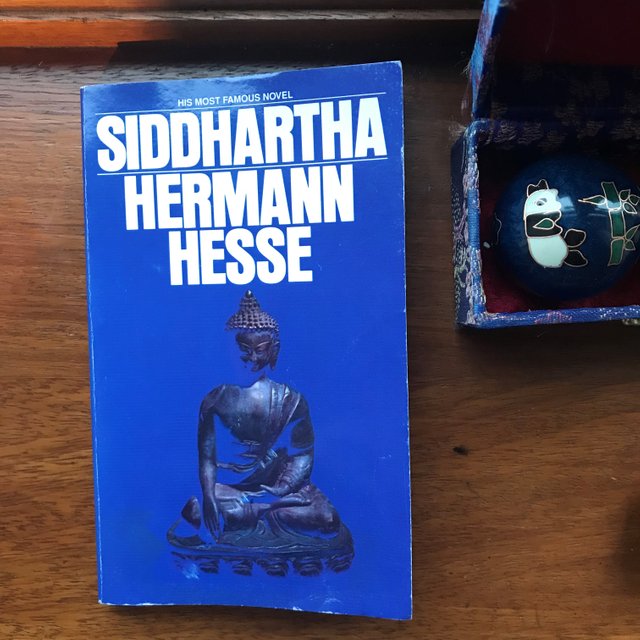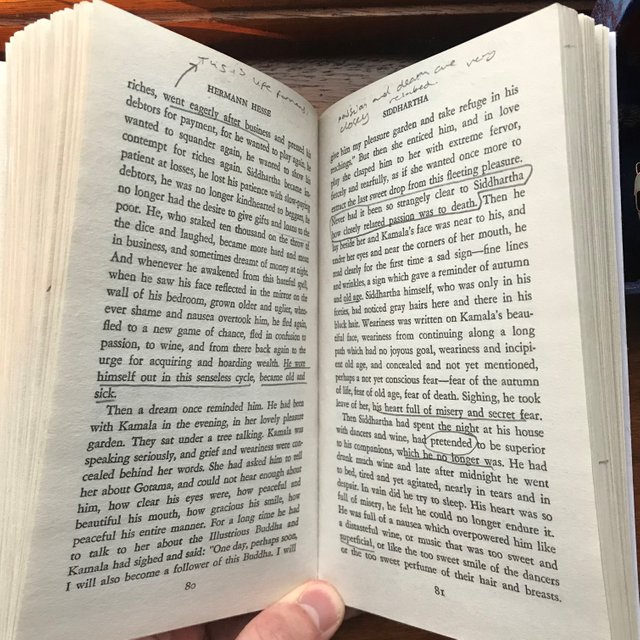Siddharta, Hermann Hesse - Bookclub #55

About the Author
Hermann Hesse was born on July 2, 1877, in Calw, Germany. His parents, Johannes and Marie, were of varied European ancestry and had done missionary work in India. Hesse was also expected to pursue a religious career, and at his parents urging he attended the theological seminary in Maulbronn.
But as Hesse would later remark, he did not possess a demeanour compatible with a rigid, often-oppressive educational system, having known from pre-adolescence that he loved poetry. After completing his schooling in 1893, Hesse found work in a bookstore, an antique store and a clock tower factory while he focused on publishing his poems and writing prose.
In the new decade, Hesse continued publishing novellas while earning acclaim for novels such as Siddhartha (1922), set in India during the time of the Buddha and reflecting the author’s own travels (which this review is about). In 1927 he published Steppenwolf, a mystical affair that chronicled the meeting of the despondent Harry Haller with the liberated Hermine. In 1930, the novel Narcissus and Goldmund followed a metaphorical work focusing on the contrasting sensibilities of a teacher and his student.
Hesse took more than a decade to complete his next, last and longest novel, The Glass Bead Game, aka Magister Ludi, which was published in 1943 and tackled the contours of a utopian society. Hesse was awarded the 1946 Nobel Prize in Literature for his body of work, with his health barring him from travelling to Stockholm to attend the ceremony. He died on August 9, 1962, in Montagnola, Switzerland.
https://www.biography.com/people/hermann-hesse-9337513

A little bit about the book
Herman Hesse's Siddharta was born into an upper-class family in ancient India and was expected by everyone to become a Brahmin (a socially or culturally superior person) like his father and has a best friend that follows him loyally called Govinda. Siddharta was born to be different than his family, being secretly dissatisfied with his existence and the expectation of what route everyone wishes him to take, he feels that something is missing. He becomes obsessed with the idea of enlightenment and focusses on religions and rituals in trying to get there. With no success and observing the fact that his father and others in his community hadn't ever reached it he decides, to the reluctance of his family he decides to take his own path. Govinda, highly influenced and admiring of his friend wants to reach enlightenment also and decides to join Siddharta in this new life.
On his journey, he learns to disassociate himself from material things, and what Hesse describes as the traditional trapping of everyday life. He, therefore, loses his desire for property, clothing, sexuality and all things that would hinder his path to enlightenment. He was influenced on his journey after meeting 'semanas' who can be described as a group of people who practices severe self-discipline and abstention. Siddharta and Govindas time spent with the semanas lead them to hear about a Buddha who has attained total spiritual enlightenment called Gotama and they decide to leave the group in search of him.
They subsequently find him and both are impressed at first but as time wore on, Siddharta found doubts about the practices of Gotama such as the eightfold path of Buddhism. He eventually moved on and left Govinda behind as he became to realise that Buddhism will not give him the answers he needs for enlightenment. From here, he moves on and embarks on a life free from meditation and instead delves into the material world once again. He meets more influential people on his journey through life, such as a friendly ferryman and his eventual lover called Kamala who teaches him essential lessons about love.

Soon, Siddharta is a rich man and is living what we today would call a successful life, as anything in the material world is his for the taking. Through this, Siddharta becomes detached from his life and can never see life as anything more than a game and this eventually takes a toll on his mental health. But Hesse makes it apparent that this was an essential part of his development as a person.
Without telling the whole story, he finds himself back on the path of non-materialism, encountering Govinda who is now a Buddhist monk, having a son, and further pushes his life towards enlightenment.
I really love this book, because it invokes feelings of the journey of life being the fruit of life. It has essential lessons for the path of enlightenment in life, through all of its negatives and positives. Also, the link with rivers and water throughout the book and the properties they have to invoke inner peace is something I relate with greatly.
Really recommend it x
The Bookclub
Ego is the Enemy, Ryan Holiday
The Wisdom Of Insecurity, Alan Watts
Tools of Titans, Tim Ferris
Homo-Deus, Yuval Noah Harari
Radical Acceptance, Tara Brach
Born a crime, Trevor Noah
How brands grow, Byron Sharp
Tales of modern Russia, Peter Pomerantsev
Stone Soup, Marcia Brown
How to get filthy rich in rising Asia, Mohsin Hamid
The Art of War, Sun Tzu
Why Bob Dylan Matters, Richard F. Thomas
On the Shortness of Life, Seneca
Not Fade Away - A short life well lived, Peter Barton
Blockchain Revolution, Alex and Don Tapscott
What I know for sure, Oprah Winfrey
Man's Search for Meaning, Viktor E. Frankl
Creativity Inc., Ed Catmull
Meditations, Marcus Aurelius
The Rational Optimist, Matt Ridley
What Makes Sammy Run? , Budd Schulberg
How to Develop Self-Confidence in Public Speaking, Dale Carnegie
How to Win Friends and Influence People, Dale Carnegie
As a Man Thinketh, James Allen
The Four Agreements, Don Miguel Ruiz
The Magic of Thinking Big, David J. Schwartz
The Great Philosophers, Edited by Ray Monk & Frederic Raphael
The Outsiders, William N. Thorndike
Invested, Danielle & Phil Town
The Last Hours of Ancient Sunlight, Thom Hartmann
The Obstacle is the Way, Ryan Holiday
Zen Flesh, Zen Bones, Paul Reps
The Prince, Niccolo Maciavelli
Think and Grow Rich, Napoleon Hill
Unshakeable, Tony Robbins
The War of Art, Steven Pressfield
Leonardo Da Vinci, Walter Issacson
Onwards, Howard Schultz
The Long and Short of It, John Kay
Prisoners of Geography, Tim Marshall
Total Recall, Arnold Schwarzenegger
Steve Jobs, Walter Issacson
Thus spoke Zarathustra, Freidrich Nietzche
The Everything Store, Brad Stone
Zero to One, Peter Thiel
Zen and the Art of Happiness. Chris Prentiss
The Lessons of History, Will and Ariel Durant
Living with a Seal, Jesse Itzler
The Innovators Dilemma, Clayton M. Christensen
Steppenwolf, Hermann Hesse
Red Notice, How I became Putin's No.1 Enemy, Bill Browder
Ishmael, Daniel Quinn
The Alchemist, Paul Coelho
The Third Door, Alex Banayan